
Arne Schimmer :
Allemagne : le scandale Sieferle
« Finis Germania », le livre d’un professeur qui ébranle le politiquement correct
Comment un journaliste du « taz » a promu involontairement les ventes d’un livre, qu’il jugeait scandaleux, et a offert une notoriété immense à son auteur décédé. Rolf Peter Sieferle est ainsi devenu un auteur à succès post mortem.
Avant qu’il ne se soit donné la mort le 17 septembre 2016 à Heidelberg, le nom de Rolf Peter Sieferle n’était guère connu, sauf dans un cercle d’amis et de collègues assez restreint. Pourtant, ses collègues et ses lecteurs, peu nombreux, savaient qu’ils avaient affaire à l’un des derniers « savants universels », celui qui avait exploré jusqu’aux moindres détails l’histoire de la nature et des techniques depuis le paléolithique jusqu’à nos jours. Tout au début de l’été 2017, son nom, tout d’un coup, fait la une des journaux après que l’on a appris qu’il avait publié un petit livre auprès des éditions « Antaios », intitulé Finis Germania. Ce petit volume rassemble des textes qu’il avait laissés dans un tiroir avant de se suicider. Le livre figurait sur la liste des « ouvrages du mois » en juin. Cette liste est dressée par les critiques littéraires allemands, sous le double patronage de la radio « Norddeutscher Rundfunk » et du quotidien Süddeutsche Zeitung. Brusquement, les auteurs se sont rendus compte qu’ils avaient recommandé un ouvrage publié par une maison d’édition qu’ils estampillaient habituellement d’« extrême-droite ».
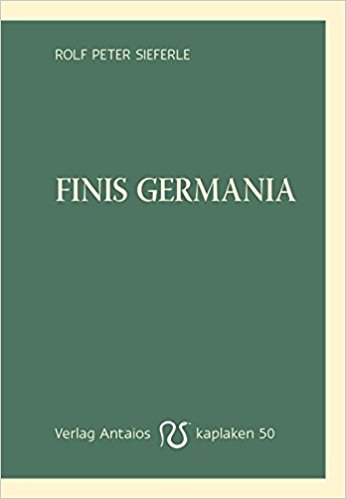
Qui donc était ce Rolf-Peter Sieferle ? Né le 5 août 1949 à Stuttgart, il étudiera ultérieurement l’histoire, les sciences politiques et la sociologie à Heidelberg et à Constance. A l’époque de ses études, Sieferle se sentait proche du mouvement de 68. En 1977, fidèle à cette option socio-politique, il rédige une thèse de doctorat intitulée Die Revolution in der Theorie von Karl Marx et la soumet à la faculté de philosophie de l’université de Constance. En 1984, toujours dans la même université, il soumet une seconde thèse de doctorat en histoire contemporaine. Deux ans auparavant, Sieferle avait publié un ouvrage qui avait immédiatement fait fureur, Der unterirdische Wald (= La forêt souterraine). Ce livre fit de lui un spécialiste incontesté d’une nouvelle discipline, l’histoire de l’environnement, l’histoire d’un point de vue écologique.
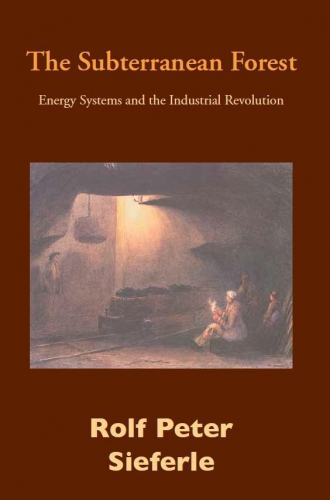
Dans ce livre, Sieferle concluait que sans l’usage intensif des énergies fossiles, en l’occurrence le charbon, la révolution industrielle aurait démarré bien plus lentement mais se serait déroulée sans les âpres luttes sociales qui sont à la base des crises des 19ème et 20ème siècles. Deux ans plus tard, l’année de son deuxième doctorat, Sieferle publie un nouvel ouvrage Fortschrittfeinde ? Opposition gegen Technik und Industrie von der Romantik bis zur Gegenwart (= Ennemis du progrès ? L’opposition à la technique et à l’industrie du romantisme à nos jours). Ce livre constitue le premier vrai travail, solidement étayé de références, sur l’histoire du mouvement de protection de la nature en Allemagne.
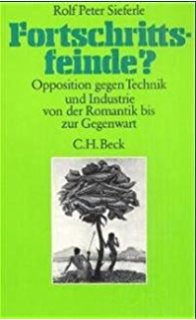
A partir de 1989, il obtient un poste de « Privatdozent » à l’université de Mannheim, qui devient, à partir de 1991, un professorat extraordinaire. En 1994, il se fait remarquer pour l’excellence d’un solide essai, même auprès des vertueux autoproclamés de service : Epochenwechsel : Die Deutschen an der Schwelle zum 21. Jahrhunderts (= Changement d’époque : les Allemands au seuil du 21ème siècle). Sieferle explore le « champ de bataille de l’histoire » qu’est son pays pour conclure que la situation y est toujours aussi explosive et dangereuse après la chute des régimes communistes.
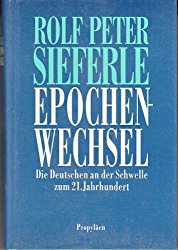
Dès le milieu des années 1990, Sieferle critique l’immigration en avançant des arguments que l’on retrouvera dans les écrits posthumes qui font aujourd’hui scandale. Dans cet ouvrage d’il y a plus de vingt ans, Sieferle écrivait déjà : « Le lobby allemand pro-immigration, qui s’étend dans la société depuis le juste milieu libéral de gauche jusqu’à certains milieux liés aux églises et aux sectes radicales tiers-mondistes », crée une situation en se référant à une rhétorique sur les droits de l’homme, « tout en en ignorant les conséquences politiques de la manière la plus stupide qui soit ». Ainsi, poursuivait Sieferle dans les années 1990, « si cette immigration de masse se poursuit au même rythme, certains groupes de migrants deviendront des minorités culturelles ou nationales, avec pour corollaire logique qu’ils exigeront des droits particuliers ». L’erreur fondamental, commise par ce lobby pro-migrants, est la suivante : il part a priori du principe que les immigrants finiront par s’assimiler au modèle et aux valeurs de l’Occident, soit à l’« universalisme humanitaire », qui, lui-même, est une particularité et non un jeu de valeurs universelles, que les masses immigrantes vont finalement réduire à une position minoritaire.
Le « socialisme prussien » comme alternative
Pour les Allemands qui vivent dans leur propre pays, la situation pourra devenir dramatique dans un futur proche. Sieferle : « Pour les universalistes humanitaires, cela n’a aucune importance de savoir qui s’installe en Allemagne car, pour eux, l’Allemagne n’a plus aucune signification ». Ce mouvement en faveur de l’immigration, poursuit-il, est finalement « un facteur de dissolution de l’Etat social en tant qu’Etat national et d’autodestruction culturelle ». Car, s’aperçoit Sieferle, « une immigration de masse a pour conséquence logique qu’il y aura de moins en moins à partager ». « Le mouvement pro-immigration ne peut plus demander qu’une chose aux populations des zones où règne le bien-être matériel : exiger d’elles sur le plan éthique qu’elles partagent leurs acquis matériels, qu’elles ont accumulés en travaillant, avec les zones où règne la pauvreté, tout en s’exposant sans résistance à la concurrence des immigrés sur le marché du travail et tout en alimentant ces derniers par le biais de l’Etat social ». Ce livre de Sieferle mérite la lecture aussi parce qu’il réclame explicitement une réorientation politique générale de la République fédérale vers un modèle d’ordre politique inspiré par le « socialisme prussien ». Ce type de socialisme devait aussi aider les populations d’Allemagne, surtout d’Allemagne de l’Est, à surmonter les problèmes socio-économiques liés à la récente réunification. En effet, le chômage restait (et reste…) élevé dans les nouveaux Länder qui, jadis, faisaient partie de la RDA socialo-communiste.Il fallait nécessairement y assainir l’industrie et y construire des infrastructures nouvelles. L’élimination de tout le ballast inutile de la gestion socialo-communiste nécessitait de l’Etat un rôle plus actif que celui que préconisent les doctrines libérales en vigueur à l’Ouest.

Pour Sieferle, la réunification de 1990 postulait une « re-continentalisation » de l’Allemagne et, par voie de conséquence, la nécessité de «penser à faire coïncider deux courants », notamment « la redistribution nationale et la solidarité, d’une part, et, d’autre part, une économie marquée par un haut degré d’interventionnisme étatique ». Sieferle en arrivait à la conclusion dès le milieu des années 1990 : « La combinaison de ces deux facteurs correspond au vieux programme du socialisme prussien ou national ». Une certaine Suzanne Gaschke, journaliste à la Frankfurter Allgemeine Zeitung, reprochait à Sieferle, déjà à l’époque, « de vouloir donner le coup de grâce à l’universalisme moralisant et valétudinaire ». Fielleuse, elle ajoutait « que chaque sou donné pour l’achat de ce bouquin était un sou de trop ». Sieferle ne s’est pas laissé impressionner par les commentaires de cette journaliste hostile : au contraire, il a immédiatement décidé d’approfondir l’idée du « socialisme prussien ». En 1995, il publie une étude sur le sujet : Die konservative Revolution. Ein Essay. Ce livre est constitué d’une série de portraits : Paul Lensch, Werner Sombart, Oswald Spengler, Ernst Jünger et Hans Freyer. Dans sa conclusion, Sieferle définissait la « révolution conservatrice » comme « l’ébauche d’une alternative à la modernité ». Aussitôt, un journaliste connu, Siegfried Jäger de « l’Institut de Duisburg pour les Recherches en linguistique et en questions sociales », tout de suite après la parution du livre, devine, derrière les propos de Sieferle, posé comme « un disciple de Nolte », de « vouloir gommer l’ombre nazie qui planait sur ses auteurs préfascistes favoris ».
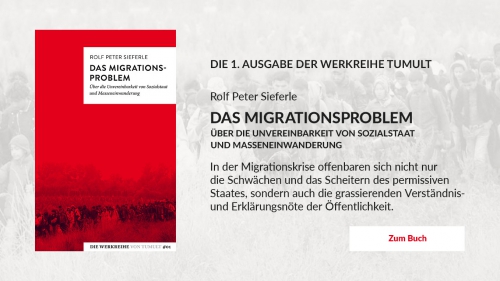
Ces petites attaques ponctuelles n’ont nullement nui à la carrière universitaire de Sieferle dans les années 1990. En 2000, il est nommé à la célébrissime université de Saint-Gall. En 1997, il publie un autre livre remarquable : Rückblick auf die Natur. Dans ce volume, Sieferle cherche à faire prendre conscience à ses lecteurs qu’en Amérique du Nord et en Europe un «archipel industriel » a émergé mais est exposé à subir de graves dangers du fait que les « structures techno-économiques » s’y soustraient de plus en plus à « la gouvernance assurée par les Etats nationaux ». Les brillantes analyses de Sieferle, reposant sur un savoir stupéfiant, trouvaient des lecteurs anonymes et discrets toujours plus nombreux. Mais cela restait relatif. Ses lecteurs se sont multipliés paradoxalement depuis son suicide à l’automne 2016. En 2005, Sieferle avait un article dans la revue Tumult, jadis organe de la gauche non orthodoxe. Cet article traitait de la crise des réfugiés, qui prenait des proportions de plus en plus incontrôlables. Cette immigration soudaine et massive aurait pour résultat rapide de mettre un terme au monopole de la violence, normalement détenu par l’Etat. Ce monopole s’amenuiserait graduellement pour faire place à des « droits tribaux », gérés par les multiples groupes de migrants. Inutile de préciser qu’avoir émis cette hypothèse faisait automatiquement de Sieferle un dissident, un contestataire inassimilable. Dans les écrits qu’il a laissés après sa mort, il tape encore sur le clou, notamment dans un texte intitulé Das Migrationsproblem : Über die Unvereinbarkeit von Sozialstaat und Masseneinwanderung (= Le problème de l’immigration. Du caractère irréconciliable entre l’Etat social et l’immigration de masse). Ce texte constituait le premier volume d’une série qu’entendaient publier les éditeurs de Tumult (la série « Werkreihe Tumult »). Sieferle constatait qu’il était impossible de consolider l’Etat social tout en maintenant ouvertes les frontières. Mais tout cela ne provoqua pas encore de débat sur ses travaux. Il a fallu attendre l’article d’un journaliste connu du « taz », Andreas Speit. Dans son journal, Speit exprima son indignation de voir qu’un volume des éditions « Antaios » avait été primé en 2017 par une mention dans la liste des meilleurs livre de « non fiction ». Ce volume, c’était Finis Germania. Du coup, le zèle de l’inquisition s’est mis en branle : on a cherché fébrilement à savoir quel insolent avait osé placer ce volume sur la liste des bons livres à lire. Généralement, les recommandations sont anonymes. Finalement, on a trouvé le « coupable » : c’était un rédacteur du Spiegel, Johannes Salzwedel, qui avoua que cela avait été grâce à ses voix que le livre avait été placé en neuvième position sur la liste. Mais le méchant travail des inquisiteurs eut, cette fois-ci, un effet contraire à celui qu’ils avaient escompté, suite à l’indignation du journaliste Speit. Un débat public et animé s’ensuivit, avec, pour objet, la présence de ce volume hérétique dans la liste des bons livres. Ce débat fit que le livre arriva en première place dans les ventes d’ « amazon.com », même que cette multinationale du livre avait ôté de ses stocks tous les livres de l’éditeur « Antaios », suite à une première vague d’épuration. Les chiffres mirobolants des ventes sont donc dus exclusivement aux ventes d’offreurs secondaires qui utilisent partiellement « amazon.com ». Toute la campagne des inquisiteurs eut pour effet que Sieferle a enfin trouvé post mortem le vaste public que méritaient ses publications et qu’elles n’avaient jamais trouvé de son vivant.
Le petit volume Finis Germania, publié dans la collection Kaplaken de l’éditeur « Antaios » est un concentré de l’œuvre de son auteur : il a la brièveté dense des aphorismes, il est succinct et clair, il vise l’essentiel. Les titres des chapitres résument à eux seuls déjà toute la pensée de l’auteur : « Voie allemande et perspective des vainqueurs » ; « La nouvelle religion d’Etat » ; « La logique de l’antifascisme ». Le petit volume résume bien le grand livre de Sieferle, Epochenwechsel (cf. supra) de 1994. La densité et la brièveté de ses réflexions conviennent bien à un vaste public. Ce qui me permet de terminer avec une tirade d’humour noir à l’adresse du sieur Andreas Speit : celui qui creuse la tombe de son voisin, y choit lui-même !
Arne SCHIMMER.
(article paru dans « Deutsche Stimme », août 2017).
Rolf Peter Sieferle, Finis Germania, Reihe kaplaken, Ed. Antaios, Schnellroda, 104 p., 8,50 euro.
Kontakt
Gerne nehmen wir Ihren Anruf entgegen.
034632-904396
Fax: 034632-904397
Mo. bis Fr.: 8-16.30 Uhr
Schreiben Sie uns eine E-Mail:
vertrieb@antaios.de
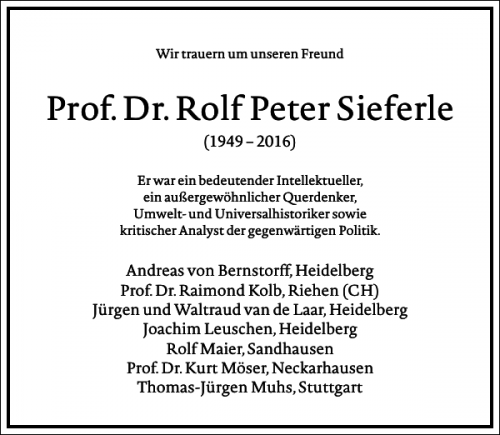



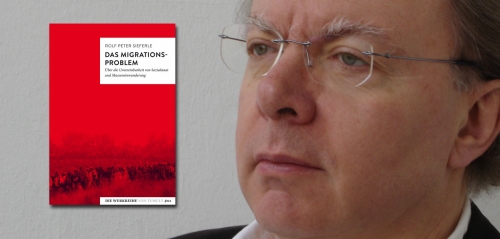

 del.icio.us
del.icio.us
 Digg
Digg






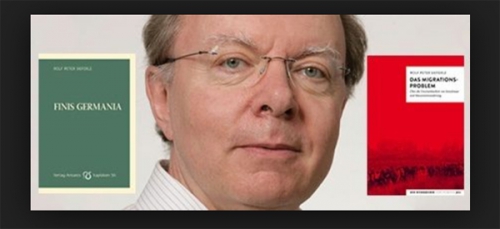
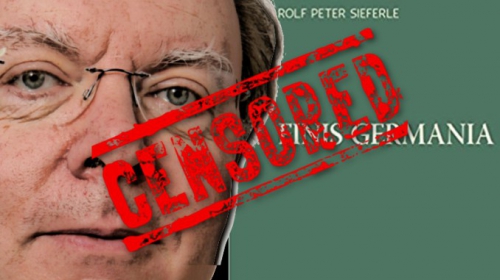
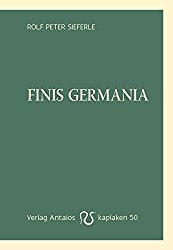 Auch der vielfach in der Geschichtsschreibung aufgenommene Terminus vom „deutschen Sonderweg“, der mit dieser Problematik eng verknüpft ist, lasse sich allein mit dem Hinweis darauf relativieren, dass er die Annahme eines „Normalweges“ voraussetze. Dieser wiederum sei abhängig vom Definierenden und damit ebenso hypothetisch wie an Zeit und persönlichen Standort gebunden.
Auch der vielfach in der Geschichtsschreibung aufgenommene Terminus vom „deutschen Sonderweg“, der mit dieser Problematik eng verknüpft ist, lasse sich allein mit dem Hinweis darauf relativieren, dass er die Annahme eines „Normalweges“ voraussetze. Dieser wiederum sei abhängig vom Definierenden und damit ebenso hypothetisch wie an Zeit und persönlichen Standort gebunden.